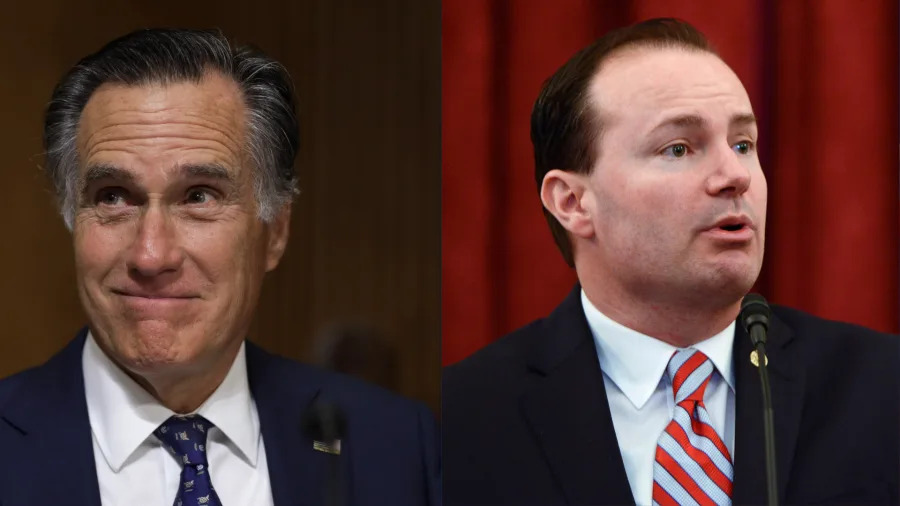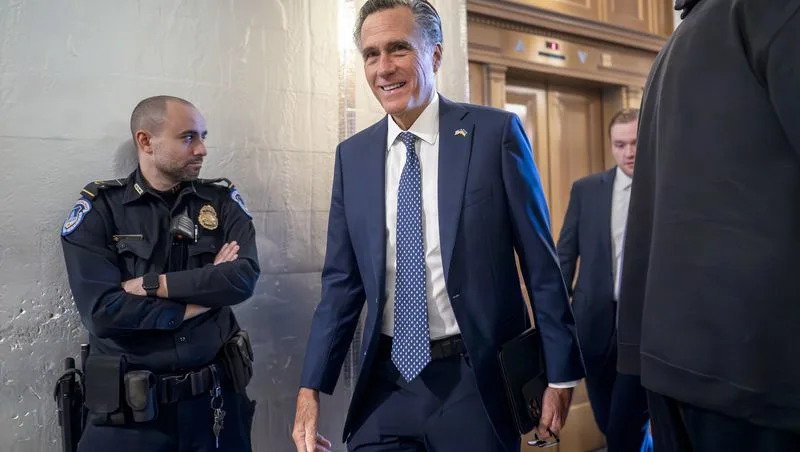The New York Times
Here Are the Republicans Breaking With Their Party to Back Ukraine Aid
Carl Hulse – February 13, 2024

WASHINGTON — Seventeen Senate Republicans have bucked a majority of their party and former President Donald Trump in joining Democrats to push military assistance for Ukraine toward approval in the Senate, highlighting a widening foreign policy divide in the contemporary Republican Party.
The 17 senators, mainly national security hawks who include several military veterans, have provided the votes necessary to overcome multiple filibusters backed by a majority of their colleagues, clearing the way for approval within days of $95 billion in aid to Ukraine, Israel and allies in the Pacific region.
“The thread that binds that group together is national security,” said Sen. Jerry Moran, R-Kan., who is one of the 17. “America’s national security, the belief that what happens in Ukraine matters to the United States, the belief that what happens in Israel matters and the belief that what happens in the South Pacific matters.”
Backing the funding could draw condemnation from Trump and his allies, a possibility that was most likely a factor in the decision of some to oppose it.
Some Republicans who have balked at the bill have suggested that they could ultimately back the legislation on final passage after trying to use their opposition to win the chance to change it — an effort that has so far not proved successful. But whether more than half of the 49 Republicans will vote for it remains an open question.
Here’s a closer look at the defectors so far, and what is motivating them.
All But Two of the Senate’s Republican Leaders
The group includes the two top Senate Republicans, Mitch McConnell of Kentucky and John Thune of South Dakota, as well as two others on the leadership team: Sens. Joni Ernst of Iowa and Shelley Moore Capito of West Virginia.
Two other leaders, Sens. John Barrasso of Wyoming and Steve Daines of Montana, both of whom have endorsed Trump, are opposed.
The sharp split on the funding inside the top echelons of the Senate Republican Conference mirrors a sharp division inside the party, which for much of the post-World War II era has been a strong proponent of exerting American power overseas and standing by U.S. allies. But there is a growing and strong sentiment among Republicans — encouraged by Trump — toward withdrawing from foreign involvement.
McConnell has been among the most vocal proponents of sending aid to Ukraine. He has called Ukraine’s war against Russian aggression an existential issue and argued with increasing fervor in recent days that the United States must not abandon its democratic ally standing up against President Vladimir Putin of Russia.
Sen. Rand Paul, R-Ky., who has been leading an effort to slow-walk the military assistance measure, on Monday called the idea that bolstering Ukraine was essential to America’s national security “ludicrous.”
“I think sending money to Ukraine actually makes our national security more endangered,” Paul said. “The leadership has come together, but it is the wrong kind of compromise. It is a compromise to loot the Treasury. They are shoveling out borrowed cash.”
Others who voted for the funding include Sens. John Cornyn of Texas, a former top Republican who is interested in rejoining leadership, and Chuck Grassley of Iowa, the longest-serving Senate Republican.
National Security Leaders and Veterans
Several members of the Armed Services Committee have backed moving ahead with the bill, including Sen. Roger Wicker of Mississippi, the senior Republican on the panel, Sens. Mike Rounds of South Dakota and Dan Sullivan of Alaska, and Ernst.
Ernst served overseas as an Iowa National Guard officer, and Sullivan is a colonel in the Marine Corps Reserve. A third Republican veteran who has been a strong backer of the aid, Sen. Todd Young of Indiana, is a former Marine officer.
Democrats have praised the Republicans who have joined them in the Ukraine effort.
“I think they understand the necessity of supporting Ukraine, particularly since this is a contest between a rules-based international order and Russian autocracy,” said Sen. Jack Reed, D-R.I., chair of the Armed Services Committee. “They also understand that it could involve our service members soon.”
Mainstream Republicans and Appropriators
Members of the Appropriations Committee, including two more-centrist senators — Susan Collins of Maine, the senior Republican on the spending panel, and Lisa Murkowski of Alaska — have also been instrumental in pushing the aid. Other appropriators behind the bill include Moran, Sen. John Kennedy of Louisiana and Capito.
The measure has the backing of a handful of others who have been known to break with their party and support bipartisan compromises, including Sens. Mitt Romney of Utah, a member of the Foreign Relations Committee; Bill Cassidy of Louisiana; and Thom Tillis of North Carolina.
“I think there is a common understanding that if we fail on this vote, if we don’t support Ukraine — this is not bluster, this is not hyperbole — bad things are going to happen,” Tillis said Monday.
Republican backers of the legislation say they cannot worry about Trump or the potential electoral consequences given the urgency behind the push to restrain Russia and avoid a wider war in Europe or Asia.
“The stakes are high, and we must meet the moment,” Collins said.
As for a potential backlash, Tillis said he was not worried.
“I slept like a baby last night,” he said, referring to his vote Sunday to overcome the filibuster by a majority of his Republican colleagues.
The following is an alphabetical list of the 17 Republicans who voted to advance the bill past its final procedural hurdle on Monday:
— Sen. Shelley Moore Capito of West Virginia
— Sen. Bill Cassidy of Louisiana
— Sen. Susan Collins of Maine
— Sen. John Cornyn of Texas
— Sen. Joni Ernst of Iowa
— Sen. Chuck Grassley of Iowa
— Sen. John Kennedy of Louisiana
— Sen. Mitch McConnell of Kentucky
— Sen. Jerry Moran of Kansas
— Sen. Lisa Murkowski of Alaska
— Sen. Mitt Romney of Utah
— Sen. Mike Rounds of South Dakota
— Sen. Dan Sullivan of Alaska
— Sen. John Thune of South Dakota
— Sen. Thom Tillis of North Carolina
— Sen. Roger Wicker of Mississippi
— Sen. Todd Young of Indiana








